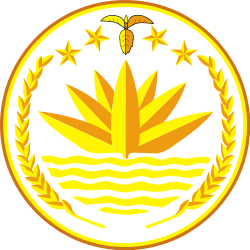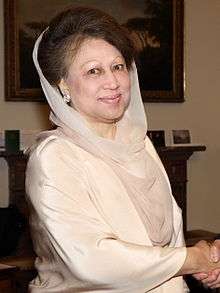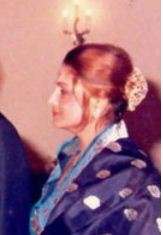Next Bangladeshi general election
| | |||||||||||||||||||||||||||||||||||
| |||||||||||||||||||||||||||||||||||
| |||||||||||||||||||||||||||||||||||
| |||||||||||||||||||||||||||||||||||
 |
| This article is part of a series on the politics and government of Bangladesh |
|
Constitution |
|
Executive |
|
|
Political parties |
|
Foreign policy |
The next Bangladeshi general election will elect the members of the Jatiyo Sangshad, the parliament of Bangladesh, on a date to be determined.
Barring exceptional circumstances, the Constitution of Bangladesh requires that the elections take place within the 90-day period before the expiration of the term of the Jatiyo Sangshad.[1][2] The current Sangshad first sat on 29 January 2014,[3][4] so in accordance with article 123(2)(a) of the Constitution, the next election is expected be held on a date between 31 October 2018 and 28 January 2019. Snap elections can be held under certain conditions, such as if a government loses a confidence motion or resigns by dissolving parliament.
Background
The previous general elections, which took place in 2014, were boycotted by the main opposition party, the Bangladesh Nationalist Party led by three-time former Prime Minister Khaleda Zia. As a result, the Awami League led by Prime Minister Sheikh Hasina won a landslide, with its candidates declared victors in 127 of the 154 uncontested seats by default.[5] Of the remaining uncontested seats, the Jatiya Party led by Rowshan Ershad won 20, the JSD won three, the Workers Party won two, and the Jatiya Party (Manju) won one.[6]
As a result of violence and the opposition boycott, voter turnout was only 22%.[7][8] Results of 139 seats out of 147 were released, with the Awami League winning 105, the Jatiya Party winning 13, the Workers Party winning four, the JSD winning two and the Tarikat Federation and BNF winning one each.[6] The remaining 8 constituencies election were suspended due to violence and re-election to be held.[6] The newly elected MPs were sworn in on 9 January.[9]
References
- ↑ "The Constitution of the People's Republic of Bangladesh: 72. Sessions of Parliament". Legislative and Parliamentary Affairs Division. Ministry of Law, Justice and Parliamentary Affairs. Retrieved 20 January 2016.
- ↑ "The Constitution of the People's Republic of Bangladesh: 123. Time for holding elections". Legislative and Parliamentary Affairs Division. Ministry of Law, Justice and Parliamentary Affairs. Retrieved 20 January 2016.
- ↑ "Parliament session on Jan 29". bdnews24.com. 13 January 2014. Retrieved 20 February 2016.
- ↑ Karim, Mohosinul (13 January 2014). "First session of 10th parliament Jan 29". Dhaka Tribune. Retrieved 20 February 2016.
- ↑ "BBC News - Clashes and boycott mar Bangladesh election". Bbc.co.uk. 12 December 2013. Retrieved 6 January 2014.
- 1 2 3 "Repolls ordered in 8 constituencies". bdnews24.com. 14 September 2013. Retrieved 6 January 2014.
- ↑ Barry, Ellen (5 January 2014). "Low Turnout in Bangladesh Elections Amid Boycott and Violence". The New York Times. Retrieved 27 May 2014.
- ↑ "Bangladesh ruling party wins after boycotted vote". The New York Times. 6 January 2014. Retrieved 5 January 2014.
- ↑ "Newly elected Bangladesh MPs sworn in". Al Jazeera English. 9 January 2014.


